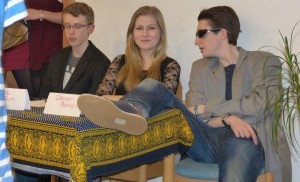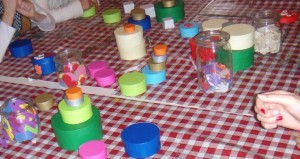Palermo- Achim –Palermo
We travelled from Palermo to Bremen and then to Achim on 27 Nov 2013 for the big meeting on volunteering. On our first day at Cato Bontjes van Beek Gymnasium we explained to all our school partners, students and teachers all the volunteering activities we have been doing at school to help raise money for charity organizations and other needy people such as refugees. We mentioned the Comenius football match that was played last spring to contribute to the fundraising activity in this project and how a bake sale was planned for the school community for the 13th of December, the day of Santa Lucia. We also illustrated the commitment a group of fellow students have with the church of Santa Chiara in the city centre and the children of migrant families, coming mostly from Africa who live in the neighbourhood.
The greatest thing we did in Germany was the Christmas market! Everybody brought something from home and sold it for charity.
The German school also organized several interesting activities: we visited the historic city of Bremen, the Mercedes-Benz factory, and the Klimahaus in Bremenhaven. This attraction is a sort of science museum where you can see the whole world just walking through different rooms where particular habitats are recreated according to their climates.
In our spare time we could do several activities with our host families: some of us went to Hamburg, in fact. And one evening we all had a pizza together.
All in all it was a a great experience to meet again, learn about the German lifestyle in a German family, practice our English and visit amazing places.
Category Archives: Achim – Germany
Achim in Górowo
Our mobility in Poland already started in the bus from the airport in Gdansk to Górowo. Seeing all the little villages from the bus was interesting. When having arrived at the school we were picked up by our lovely host families. We enjoyed a delicious dinner and met outside with all Comenius people to take a look around the pretty city of Górowo. The next day we met in the school and visited some interesting places in Górowo.
Later that evening we met to have a nice slice of pizza and some interesting conversations. We also went to the impressive border between Poland and Russia.
In the afternoon we visited two employers: the newspaper and the fire station close to Górowo. We spent the evening dancing and laughing in the restaurant. Another day we visited Olsztyn where we had a guided tour through the city and the museum of Copernicus. Later in the afternoon, after a long walk, we went ice-skating and shopping. It was great! The last evening we had a BBQ in the garden of one of our polish friends. The next day we were leaving, so we had to get up in the middle of the night to catch the bus to the airport in Gdansk. Then we discovered the old, beautiful city with all the famous sights. We also had a delicious lunch with the finish girls.
All in all our trip to Poland was a great experience because we got to know the polish culture and made a lot of new friends!
Achim is great!
Film by Julian Siefert
Aspects of Employment in Germany
(1) Unemployment rate in Germany/Verden
In February 2014 the unemployment rate in Germany makes up 7,3 percent. In the region of Verden it is only about 5,7 percent. Both percentages stayed at the same level since January.
Seen nationally these percentages were higher before, so this is a positive development. For example in 2005 the unemployment rate was up to 11,7 percent. This was the highest rate only looking at the years between 1991 and 2012. 1991 was the year with the lowest unemployment rate, it was only about 6,4 percent.
These Figures include males and female at all ages. Generally the unemployment rate of males is higher than the rate of females. People in the middle age have a lower unemployment rate while young people and old people have a higher unemployment rate. This is because younger people often don’t find a job directly after their studies or school. It takes a few years to find a job that fits. Elder People sometimes don’t find a job because the different companies think it isn’t worth it to engage them, because probably they get ill often and they can’t work as fast as young people.
(2) The minimum age you could start working
13: little jobs (e.g. deliver newspaper, babysitting, tutoring)
15: holiday work (4 weeks a year / 8 h a day)
15-17: allowed to work 8 hours a day (max. 40 hours a week)
(3) The most common jobs in your regions
Bremen:
-High-Class yacht building & military ships (Abeking&Rasmussen, Lürssen )
-Car building ( Mercedes-Benz )
-Logistics ( BLG )
-Plane building and space travel ( Airbus, Atlas )
-food production ( Könecke, Kellogg`s, Hachez, Beck`s )
-pet products ( Vitakraft, Kraftfoods )
In our region, Lower Saxony, the top ten of the most common jobs are:
1. Merchant in retail
2. Salesman
3. Automotive mechatronics engineer
4. Office administrator
5. Merchant in external trade and wholesale
6. Industrial clerk
7. Electronics engineer
8. Banker
9. Qualified medical employee
10. Cook
All in all there are round 63.000 apprenticeship places in Lower Saxony, this is actually a really bad result.
(4) The average salary
09/ 2013: average salary in total Germany 2988€ a month — Bremen: 2634€ a month
Results of Volunteering questionnaire from Achim
Survey: Volunteering and jobs in Achim
(177 Year 9 and 78 Year 10 students handed in their questionnaires)
1) Do you do volunteer work?
- Yes: 25% / 13%
- No: 75% / 87%
2) If you do not, why?
- No time: 50% / 74%
- Do not want to: 24% / 25%
- other reasons: 26% / 1%
(no money, nothing interesting, just moved here, could not find anything)
3) Have you ever done volunteer work?
- Yes: 46% / 40%
- No: 38% / 59%
4) Approximate hours spent in a year on volunteer work.
- Once a year: 16% / 18%
- Twice a year: 17% / 11%
- Once a month: 10% / 27%
- Once a week: 36% / 11%
- More often: 21% / 33%
5) What activities are you engaged in?
- Year 9: church work, fire brigade, sports clubs, family help, garage, swimming pool,
dance coach, golf coach, Red Cross
- Year 10: babysitting, church work, dog walking, household, refereeing, collecting
paper, reading, fire brigade, sports coach, collecting rubbish
6) Have you got a job?
- Yes: 27% / 43%
- No: 57% / 57%
7) If not, why?
- No time: 53% / 70%
- Do not want to work: 23% / 16%
- Others: 24% / 14%
(too young, no qualifications, have not found anything, do not need to work)
8) If yes, which job?
- Doing paper rounds: 55% / 15%
- Babysitting: 40% / 33%
- Tutoring: 4% / 30%
- Others: 1% / 22%
(petrol station, mowing lawns, pizza delivery service, waiting tables, supermarket, fast food restaurants, etc.)
9) Hours per week spent working:
- Year 9: between 1 hour per week and 10 hours per week
- Year 10: between 1 hour per week and 12 hours per week
Volunteering in church
In our church community it is possible to volunteer. We are helping our priest to prepare the confirmation lessons and two times a year we are going on a confirmation ride. With many voluntary young people we prepare special program and games to play there. It has to do with church but it is not only the boring old school stuff. Sometimes we also dress up to play special roles in games.  We are also helping to do a kind of bible breakfast thing for children. Also with many volunteers we prepare a delicious breakfast and after that we are singing songs, playing games and talking about the bible. The children have much fun, there are round about 30-40 children at one “meeting”. So in our parish we need volunteers in all fields to organize everything. During the voluntary work we have a lot of fun together and the breakfast and the lessons are always a great time, even though it’s sometimes a bit strenuous!
We are also helping to do a kind of bible breakfast thing for children. Also with many volunteers we prepare a delicious breakfast and after that we are singing songs, playing games and talking about the bible. The children have much fun, there are round about 30-40 children at one “meeting”. So in our parish we need volunteers in all fields to organize everything. During the voluntary work we have a lot of fun together and the breakfast and the lessons are always a great time, even though it’s sometimes a bit strenuous! 
Voluntary social work-year in Germany – a big chance to decide
If you want to involve yourself in social work you have the opportunity to do a voluntary social work-year. To do so you have to be in the age of at least 16 up to 25. Solely in Bremen around 600 youngsters are working as volunteers to support society. You can do this in different fields like in social institutions (for example a kindergarden or an old-people´s-home), in cultural institutions (like the church) or sports clubs. It is a wonderful opportunity to get many experiences for your subsequent life and incidentally it looks impressive in your CV.
Here are some voices about this institution:
A 19 years old girl said about her voluntary social work year that it was helpful for her because she didn´t know what kind of work she wants to do in the future. During this year lots of people get a lot of experience and they learn what qualifications are necessary for their voluntary jobs. She thinks that she learned a lot and after this year the girl knows what she wants to be in the future.
A girl of the same age experienced in her voluntary social work year what she is going to do in her future. She already knew that she liked the contact to little children and that’s the reason why she made her year in a kindergarten. It was an assurance for her because now she knows that she will do an apprenticeship as an educator for children. The girl became more self-confident and she sees this year as an enrichment for her further life.
Optimist Engbi didn`t know what he would do when he is finishing his A-level. So he decided to do a social year. He worked as a male nurse with disabled person. Engbi got experiences for his life. After the year he knew that a social job would be the best job for him.
Marcel Latacz did a social year in a institution for handiecapped people and a kindergarden in Bremen. Firstly he worked in the institution for handiecapped people. Later he moved to the kindergarden, where he was a lot happier. He think´s that his self-confidence became stronger. In addition to this he is thinking that he is now more open towards other people. All in all it was a postive experience for him.
